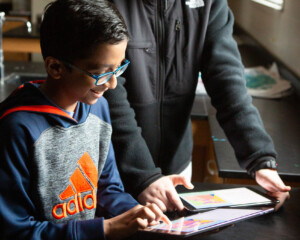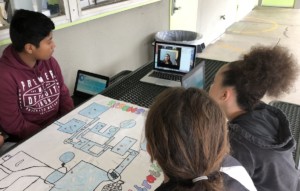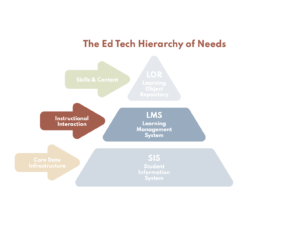A Bunch of B.S.: The Antidote for #EdTech Negativity

At least one thing is certain about today’s educational system: change is here. Change is every day. In fact, keeping up with educational technology seems to be an insurmountable task at times but one worthy of all educators’ best efforts. One aspect of teaching, however, that hasn’t changed is the amount of negativity heard amongst us hard-working professionals, and the constant evolution of this educational technology seems to have increased some educators’ anxiety and negativity.
I remember nearly twenty years ago my supervising, college professor guided me, a naïve twenty-two year old more interested in coaching baseball than teaching literature, through student teaching experiences that had me feeling like the inspirational John Keating from Dead Poets’ Society one minute to the beaten-down John Kimble after his first day as the Kindergarten Cop the very next moment. My professor offered sound advice. He said, “Three things you can control: 1. Stay away from any areas, such as teachers’ lounges, where negativity gathers. 2. Go into your classroom, shut the door, and teach your butt off.”
It was his third bit of advice, one that was also forever engrained in me through two amazing parents, that I have pledged to honor all my life. My professor said, “John, it really is this simple: you can be positive…or you can be negative. You know what each energy earns you. It’s your choice.”
Since then, I have often wondered why such a meek and true maxim sometimes goes unheeded. Thankfully, the rigors of teaching high school English classes kept me from playing armchair psychologist all these years.
But just a few days ago, a tweet from George Couros ignited a personal epiphany.
“people tend to resist new behaviours because they’re crystal clear on what they’ll lose by changing but uncertain about what they’ll gain.”
— George Couros (@gcouros) February 22, 2014
And that’s when it dawned on me.
What’s the antidote for #edtech negativity?
Just a bunch of B.S.
Follow me and I’ll explain.
The Problem
It seems Mr. Couros was speaking to the imbalance of clarity and specificity as it relates to teachers’ present and future professional practices. This imbalance causes teachers to cling ever so tightly with both hands to old habits and practices while rendering them unable, and possibly unwilling, to grasp new #edtech concepts.
The Solution
According to Carl Jung, “Your vision will become clear only when you can look into your own heart.” So essentially Mr. Jung offers sound advice also: to transcend any #edtech negativity all that is needed is a load of B.S.
Being Specific.
Call it what you want: exact, unambiguous, detailed, explicit, or precise.
By delving down and honestly confronting personal and professional fears while imagining the multitudes of exciting possibilities provided by educational technology, teachers can soar above any self-defeating and erroneous visions of their true potential. It’s enough to propel any teacher out of the comfort zone and into the stretch zone.
Let’s challenge this notion, shall we?
@ugaodawg @Pen63 @DaveGuymon @morgetron @leadedtech @tommytude What’s the most common, unfounded #edtech complaint you hear from teachers?
— John Hardison (@JohnHardison1) February 22, 2014
I tweeted the above question to some of my PLN and received awesome responses. The ensuing discussion caused me to be specific and candid as I peered into my own mental hiccups about educational technology.
Unfounded Complaint #1
Jodie Morgenson said the most common, unfounded complaint she hears is, “It (#edtech) makes my job harder.” Perhaps Jodie’s following tweet serves as the perfect rebuttal: “The only way this would be true is if you hated learning.” Right on, Jodie.
Back in the day when all my students had were textbooks, there wasn’t an overwhelming amount of professional learning taking place on a weekly basis. Now, I am not saying I wasn’t progressing, but aside from staying on top of my curriculum and classroom practices, the external stimuli challenging me to move forward was minimal. As long as I managed a solid classroom, treated the students with respect, encouraged creativity, and knew my content, I was fine.
Today? Not so much.
Yes, all of the aforementioned attributes of a strong learning environment still apply greatly, but educational technology has changed the landscape. For the better, I might add. I know I must stay abreast of the latest technology, so I won’t hold my students back.
Maybe I’m an #edtech junkie who needs a daily fix, but I absolutely love awakening to the learning promises made by so many cool websites and apps.
When my students were able to hear my comments about their essays, I was jacked. When they participated in a three-state, four-class tweetup, I was stoked. When they were introduced to a barrage of helpful writing apps, I floated on an ethereal cloud of professional contentment.
Was extra learning involved when I first heard of these apps? Yep. Was I reinvigorated and challenged to grow as a professional educator? Absolutely.
Being specific, the only casualties accrued since I decided to embrace edtech are teacher stagnation and boredom-induced lethargy, which do make my job harder.
Unfounded Complaint #2
My edtech Yoda and personal friend, Greg O’Dell, says teachers often claim, “‘My computer is doing (insert malware behavior) so I can’t do…’”
When I asked him if “operator error” was the common denominator, he replied, “Many times that is the case. Many blame training, but today’s tools allow one to learn just about anything.”
When we get down to the nitty-gritty of it, technology is going to have periodical glitches and occasional growing pains. But these glitches and pains are hardly a reason to abandon educational technology.
Imagine if we did this with all technology. Let’s say your cable or dish goes out. Why not take a pair of scissors and cut the cable? While you’re at it, go “Juan St. Pierre” on the flat screen too.
Perhaps your car’s air conditioner quits working during a Summer heat wave. You know the best remedy for that? Park it on the side of the road and leave it…permanently.
And Lord knows if your solar powered Seiko watch fails to show the accurate time because it hasn’t been worn, nor the seen the sun, in a year, you should definitely see how it bounces off the kitchen wall as it drops to the bottom of the trash can.
Sound reasonable? Nah.
But being specific and going to the root of the problem sounds very rational. Besides, there is most definitely a precise and informative video tutorial just waiting to be viewed online.
Unfounded Complaint #3
“Technology is making our kids anti-social.” This tweet by Simon Miller is easily refuted by Dean Shareski’s blog post that is heavily laden with specificity. Scroll down to “#3 Kids These Days” to read Dean’s take on this issue.
Additional Unfounded Complaints
@JohnHardison1 @ugaodawg @DaveGuymon @morgetron @LeadEdTech @tommytude most unfounded complaint? ‘It’d take 2much time to teach them 2do…’
— Penny Christensen (@Pen63) February 23, 2014
@JohnHardison1 I would say not enough tech devices in the classroom and yet many of the people that I hear say that don’t allow byod.
— Tommy Wandrum (@tommytude) February 22, 2014
@JohnHardison1 what I hear a lot: “the kids won’t be able to handle themselves in the classroom”
— cbeyerle (@cbeyerle) February 22, 2014
@JohnHardison1 @ugaodawg @Pen63 @morgetron @LeadEdTech @tommytude 1) It’s just one more thing. 2) No time for it.
— Dave Guymon (@DaveGuymon) February 22, 2014
@JohnHardison1 the ‘tech replacing teachers’ stuff is a ruse
— Tom Vander Ark (@tvanderark) February 22, 2014
In closing, I’ll leave you with these two quotations. They help me adhere to my college professor’s advice.
“If you really want to do something, you’ll find a way. If you don’t, you’ll find an excuse.” –Jim Rohn
“To hell with circumstances; I create opportunities.” -Bruce Lee
Now these quotes sound a lot like B.S. to me.
Yep.
Being specific.






Edsby
Loved your professor's "third bit of advice," above. It's really our choice how we appear in the world, and that influences what we get back in return. Thanks for sharing this.
Thomas Johanson
Excellent topic, I'm hosting an edtech round table at Garden Oaks Montessori Magnet in Houston March 8th at the PMET conference. I'm hoping to share my vision for an "Internet of Things" classroom design where screens aren't the focus but a digital assistant (think friendly overlord AI) allows the use of every object as a learning tool, including textbooks; and such learnig being fully registered. After all if a refrigerator can know what's in it and give menu options, why can't a classroom?
Imagine how frightening this is to the "nattering nabobs of negativity."